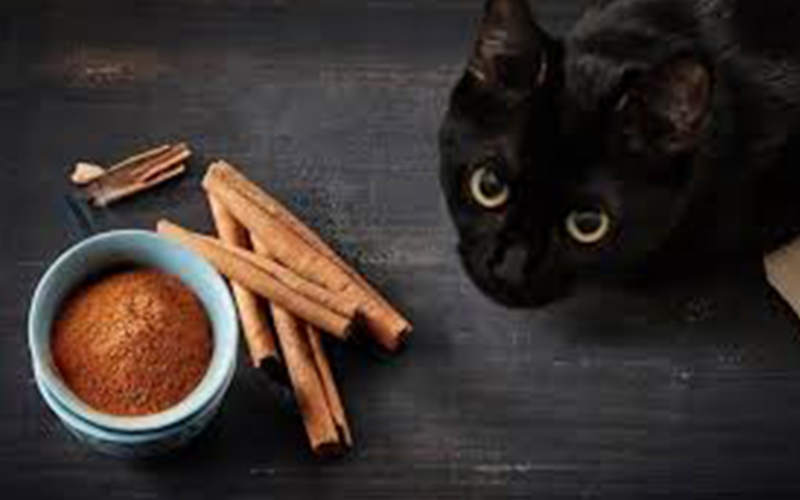Can Cats Eat Cinnamon? A Guide to Understanding the Risks and Safety of Cinnamon for Cats
- 19 Feb 2025 11:45
As a cat owner, you might be curious whether it's safe to share some cinnamon with your feline friend. Cinnamon is a commonly used spice in cooking, baking, and even health remedies for humans. However, when it comes to cats, it's important to be cautious. So, can cats eat cinnamon? The short answer is that cinnamon is not safe for cats and should be avoided.

Why Is Cinnamon Not Safe for Cats?
While cinnamon itself isn't toxic to cats in tiny amounts, certain compounds in cinnamon can be harmful, especially when ingested in large quantities. Cinnamon contains a compound called coumarin, which can be harmful to pets in high doses. Additionally, cinnamon powder can irritate your cat’s mouth, throat, and digestive tract if they accidentally ingest it.
Here’s why you should avoid giving your cat cinnamon:
1. Toxicity from Cinnamon Oil and Powder
Cinnamon oil, which is highly concentrated, can be particularly toxic to cats. Just a small amount of cinnamon oil can cause liver damage, hypoglycemia (low blood sugar), and other serious health issues in cats. Cinnamon powder, while less concentrated, can also cause irritation in your cat's mouth and stomach and may lead to vomiting or diarrhea.
2. Difficulty Digesting Cinnamon
Cats have a much more sensitive digestive system compared to humans. Spices like cinnamon, even in small amounts, can upset your cat’s stomach and lead to discomfort. Symptoms like vomiting, diarrhea, and abdominal pain can occur if your cat ingests cinnamon.
3. Potential for Respiratory Issues
Cinnamon powder can be irritating to your cat’s respiratory system. If your cat inhales the powder, it can cause coughing, sneezing, or difficulty breathing. This can be especially concerning if your cat has any existing respiratory conditions.
4. Sugar and Other Additives in Cinnamon Products
Many cinnamon-flavored products, such as baked goods or snacks, may contain other harmful ingredients for cats, such as sugar, xylitol (a toxic sweetener), and artificial flavorings. These additives are not only unnecessary for your cat’s diet, but they can also cause health issues like diabetes, weight gain, or even poisoning from certain sweeteners.
Can Cinnamon Ever Be Safe for Cats?
While plain cinnamon powder or cinnamon oil is not safe for cats, in extremely small amounts, plain cinnamon might not cause immediate harm, but it still doesn't provide any health benefits. It's best to avoid offering cinnamon at all, as the risks outweigh any potential benefits. Cinnamon isn’t an essential part of a cat’s diet, and there are many other treats and foods that are much safer and more nutritious.
What to Do if Your Cat Eats Cinnamon
If your cat has accidentally ingested a small amount of cinnamon powder or cinnamon oil, monitor them closely for any signs of discomfort. If you notice symptoms like vomiting, diarrhea, lethargy, or difficulty breathing, it’s important to contact a pet health professional immediately. In the case of cinnamon oil, it's especially important to act quickly, as the concentrated nature of the oil can be more harmful.
Safer Alternatives to Cinnamon for Cats
If you’re looking for safe treats or ways to offer your cat something special, here are some alternatives:
Catnip: Many cats love catnip, which has a mild, non-toxic effect that can make your cat feel playful or relaxed. It’s a safe and enjoyable treat for most cats.
Fresh Cat Grass: Fresh cat grass (such as wheatgrass) is a safe treat that many cats enjoy. It’s rich in fiber and can aid in digestion.
Small Pieces of Cooked Meat: Offering small, plain pieces of chicken, turkey, or fish is a great way to provide a tasty, protein-packed treat that your cat will love.
Canned Tuna (in water): If your cat enjoys fish, a small amount of canned tuna in water can be a tasty, occasional treat. Be sure the tuna is free of any added salt or seasonings.
Pumpkin Puree: Plain, unsweetened pumpkin puree can be beneficial for your cat’s digestive health. It’s a safe, natural option that’s rich in fiber.
Conclusion
Can cats eat cinnamon? The answer is no—cinnamon is not safe for cats, and it’s best to avoid it altogether. While small amounts of cinnamon may not be immediately harmful, the potential risks, especially with cinnamon oil or flavored products, are significant. Stick to safe, cat-friendly treats like catnip, cooked meat, or small pieces of fish, and avoid sharing foods that contain cinnamon or other harmful ingredients.
If you have concerns about your cat’s diet or health, consider using PettureX, a pet health software with 24/7 online consultations. PettureX can provide helpful advice on safe and nutritious foods for your cat, helping you make informed choices for your feline companion's well-being.
Related

Frankly Dangerous: Can Cats Eat Hot Dogs? Vet Explains the Serious Risks
- 16 Apr 2025
A Purrfect Protein? Can Cats Eat Ground Turkey Safely? (Vet-Reviewed Guide)
- 16 Apr 2025
Gritty Situation: Can Cats Eat Grits Safely? Vet Explains the Risks
- 16 Apr 2025
Crunchy Query: Can Cats Eat Green Peppers? A Vet-Reviewed Safety Analysis
- 16 Apr 2025
Gravy Danger Zone: Can Cats Eat Gravy Safely? (Vet-Reviewed Warning)
- 16 Apr 2025
Toxic Temptation: Can Cats Eat Grapefruit? Vet Explains the Dangers
- 16 Apr 2025
Emergency Meal or Major Mistake? Can Cats Eat Dog Food For A Couple Days? (Vet Guide)
- 16 Apr 2025
Dandelions & Felines: Can Cats Eat These Common Weeds Safely? Vet Explains
- 16 Apr 2025
Flaky Danger: Can Cats Eat Croissants Safely? Vet Explains the Buttery Risks
- 16 Apr 2025
Hazard Alert: Can Cats Eat Corn Husks? Vet Explains Dangers of This Fibrous Material
- 16 Apr 2025
